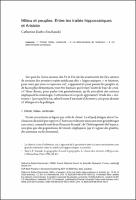Chapter Milieu et peuples. Entre les traités hippocratiques et Aristote
| dc.contributor.author | Darbo-Peschanski, Catherine | |
| dc.date.accessioned | 2022-06-01T12:16:46Z | |
| dc.date.available | 2022-06-01T12:16:46Z | |
| dc.date.issued | 2020 | |
| dc.identifier | ONIX_20220601_9788855181600_404 | |
| dc.identifier.issn | 2704-5919 | |
| dc.identifier.uri | https://library.oapen.org/handle/20.500.12657/56221 | |
| dc.description.abstract | The article compares some of the so-called Hippocratic treatises and Aristotle’s Physics, Meteorologics, Ethics and Politics, on what would define a human community, if not a nation. It shows a common absence of the notions of climate and environment but a close way of conceiving the physical continuity between the outside world (immediate or more distant) and the inside of living bodies. Then, the external conditions (seasons, temperatures, nature of the soil) similarly determine the complexions and characters of the populations that experience them. Divergences occur due to the determinism of the external conditions on politics. The Hippocratic treaties do not recognise this, unlike Aristotle, except that the Stagirite excludes from this determinism the Greek City and the virtues, including the civic virtue of justice. | |
| dc.language | French | |
| dc.relation.ispartofseries | Studi e saggi | |
| dc.subject.other | Human groups | |
| dc.subject.other | Physical continuity | |
| dc.subject.other | Determinism of external conditions | |
| dc.subject.other | Ethics | |
| dc.subject.other | Politics | |
| dc.title | Chapter Milieu et peuples. Entre les traités hippocratiques et Aristote | |
| dc.type | chapter | |
| oapen.identifier.doi | 10.36253/978-88-5518-160-0.02 | |
| oapen.relation.isPublishedBy | bf65d21a-78e5-4ba2-983a-dbfa90962870 | |
| oapen.relation.isbn | 9788855181600 | |
| oapen.series.number | 214 | |
| oapen.pages | 12 | |
| oapen.place.publication | Florence |

